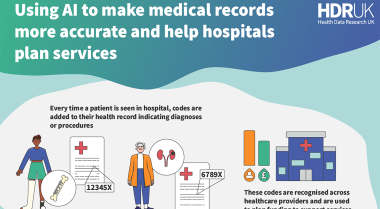Using linked data for research: challenges and opportunities within the UK health ecosystem
30 June 2022 | Author: Meredith Leston, Doctoral Researcher within the University of Oxford's Clinical Informatics and Health Outcomes Research Group (CIHORG)
Widespread efforts to digitise personal health records combined with recent advances in clinical informatics offer incredible promise for a wide range of health use-cases.
That said, the potential of Big Data in public health, particularly in a nationalised health context, is undermined by inconsistencies of health data capture, poor interoperability between datasets, and high levels of bureaucracy. In order to achieve the government’s ambitions for a digitally enabled and digitally connected NHS, more must be done to facilitate ease of data-sharing and linkage – especially between routinely-collected data (e.g. medical record) and consented (e.g. biological specimen) datasets. Doing so offers unparalleled opportunities for improving patient diagnosis, triage, treatments, and overall safety.
In this blog, I summarise the key opportunities, pain points and means of troubleshooting said pain points when it comes to linking consented with routinely-collected data in an NHS context from the perspectives of relevant leaders, policymakers, clinicians, and researchers as well as that of the public.
Examples given are based on desk research and two successful roundtables on the topic hosted by the UK Health Data Research Alliance. The purpose of these roundtables was to provide a launchpad for further discussion through a new working group convened by the Alliance. The first online session of this working group will be on 13 July and will bring together data custodians, researchers, and public contributors to explore opportunities for improvement in the use of consented and routinely-collected data for research. More information on the event and registration details can be found here.
The role of policymakers and leaders in public health
This stakeholder group stands to gain significantly from broader linkages between consented and routinely-collected data types. Potential outputs of said linkages, particularly in terms of therapeutic discovery, enhanced precision medicine, and improved population health outcomes, could translate to significant savings in national public health expenditure while positioning the UK as a global leader in health research. That said, the actions of these figures are constrained by both public scrutiny and international expectations: issues such as data privacy, security and transparency, and value for money must be prioritised. While embedding these priorities into novel data linkages between consented and routinely-collected data types is standard protocol, doing so can still accrue costs and complexity – particularly when having to respect often multiple, often inconsistent, or even unintelligible, application procedures for accessing different types of datasets.
It is essential that NHS leaders and public health decision-makers sit down with researchers and work together to streamline data sharing and linkage governance frameworks; this will ensure innovation and research requests are not held back any longer than they need to be. A first step could be to maintain the unprecedented data sharing allowances that were approved during the COVID-19 pandemic. Overall, it is essential that policymakers find the right balance of ‘top-down’ and ‘bottom-up’ decision-making when it comes to making the best use of NHS consented and routinely-collected data, leveraging the collective expertise of clinicians and the academic community. To make clinicians the most effective advisors possible more should be done to include training about information governance and data analytics in primary care curricula.
Involving clinicians in the discussion
The NHS presents a uniquely favourable landscape for big data linkages thanks to widespread incentives to codify patient data and the use of the NHS number that serves as the perfect bridge between a range of health datasets without ever compromising patient anonymity. Much of this is thanks to the efforts of healthcare workers who are responsible for bottom-up professionally led data sharing through accurate codification of healthcare and patient data at point of care delivery. That said, this represents a huge bureaucratic burden for an already overstretched workforce. As such, any initiative to link consented with routinely-collected data must be angled at reducing clinicians’ workload, rather than increasing it; any work that does depend on data entry by healthcare employees must invest sufficient time and resource into training.
Furthermore, said works must be mindful of inconsistencies in the digital maturity of health settings in the UK; certain settings may not be suitable for, or geared up to, execute big data linkages without considerable wraparound support. Finally, clinicians have expressed major concern over broadening third party access to patient medical records due to the sensitive nature of the data concerned and the risk such sharing might pose to the trust that underpins the patient-practitioner relationship. While these actors have acknowledged the benefits of such work for use-cases including drug discovery, disease surveillance and pandemic preparedness – all of which have already had significant benefits for their patients, most notably through the COVID-19 pandemic – it is essential that their concerns be addressed, and their perspectives be incorporated into study design and implementation.
The researcher perspective
Addressing barriers to accessing and linking relevant health datasets will have considerable benefits for the academic community, particularly those working within epidemiology. Precision and personalised medicine becomes more of a reality in an environment where connecting consented with routinely-collected data – either nationally or internationally – is a frictionless process. At this moment in time, however, applications for doing so are incredibly laborious and disrupted by inconsistent and overbearing governance protocols and requirements. This can completely derail research efforts and ultimately it is patients that suffer. Furthermore, the mixed and multi-media nature of NHS data (free-text, image, biological specimen, codified etc.) and the poor interoperability between NHS systems can make these linkages difficult to achieve in practice. A global framework on data linkages should be created as a matter of urgency.
It is hoped that planned government investments into Trusted Research Environments may troubleshoot some of these issues and make mixed-data linkage more feasible for more research groups both nationally and internationally. Finally, researchers might also wish to consider inviting trusted NGOs to audit datasets and data sharing and linking agreements or protocols; approvals from bodies with comparatively higher levels of public trust might reassure patients that their routinely-collected data is being shared and/or linked with their best interests at heart. Researchers should also be proactive in engaging with clinicians and encouraging them to provide appropriate feedback about their use of data to ensure all sharing and linking projects are ‘win-win’. Publishing outputs of these projects – especially those with tangible public benefits – in both layman and academic publications will be key to further bolstering public and government support for this agenda.
The Public view
As the recipients of health care, it is the public that has the most to gain from augmenting consented with routinely–consented data. Discoveries from this process – especially those leading to tailored or more impactful health treatments, products, and services – would have marked impacts on quality of life and other population health metrics. Furthermore, lowering the bar to utilising consented data (most notably biological specimen data) ensures that active public participation in health research is never wasted. At this moment in time, red tape around such work sees many samples in storage indefinitely – something deeply unethical given the good faith of participants involved. Indeed, some research even suggests that public aversion to health data-sharing or linkage might be overblown provided said work is demonstrably for the public good and not for the financial benefit of the third parties involved. Endless handwringing and over-complicated bureaucracy only slow down the discovery process that participants are often just as committed to as the researchers themselves. However, multiple issues need to be addressed to make public participation in these initiatives as easy and ethical as possible. Informed consent is key, and participants must be free to opt their data out from being shared or linked more widely.
However, inundating participants with requests for these permissions every time a proposal is put forward or including every possible instance in which their data might be used in initial consent forms would be overwhelming. As such, participants, researchers, NHS decision-makers and government stakeholders must come together to define what sufficient consent looks like in this context and whether this should be a dynamic process or if broad consent can be given at the point of data collection. Public consultation on this and other related issues must be viewed as best practice and not just a box-ticking exercise. Finally, the public must be signposted to opportunities to engage with the research community – Patient Partner Boards or Patient Advisory Group membership could be a good first start here.
The way forward
It is clear from the above that the stakeholders considered here have a considerable amount to gain from addressing current barriers to linking consented with routinely-collected health data. That said, it is necessary to address each of their concerns on this matter, in turn, to maximise the benefits of this process without undermining the trust, accuracy, and collaboration that such work relies upon. It might only take one instance of a data breach or improper monetisation to prevent this agenda from ever becoming business as usual within the NHS and achieving all that it is capable of for the benefit of public health both nationally and internationally.
With the Alliance working group on ‘Linking consented and routinely-collected data’, we hope to bring together key players who can move this discussion forward, with the view to identify best practices, develop standards and submit recommendations to relevant decision-makers to maximise the value of these important resources.
If you are interested to attend the first working group session, register here.
Meredith Leston also represent the Royal College of GPs, as a UK Health Data Research Alliance Member.



